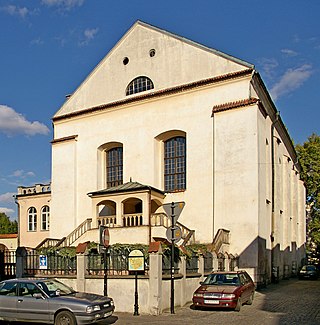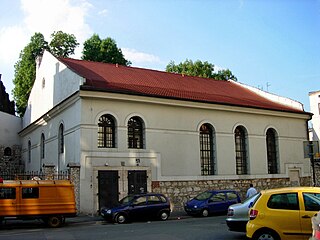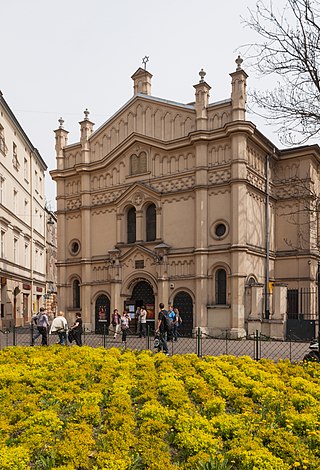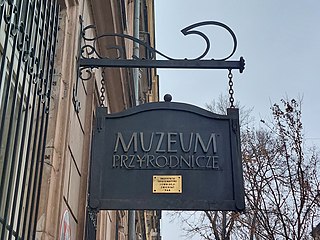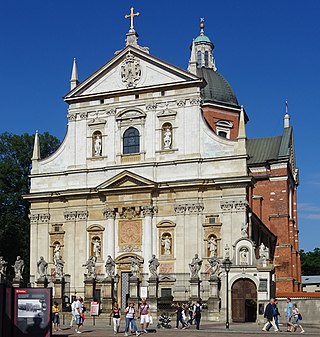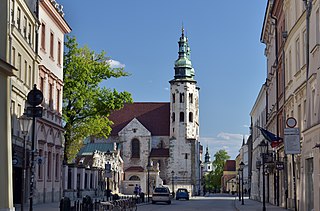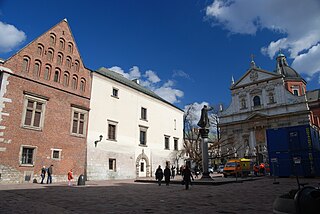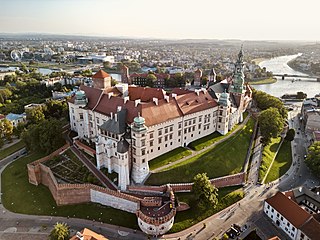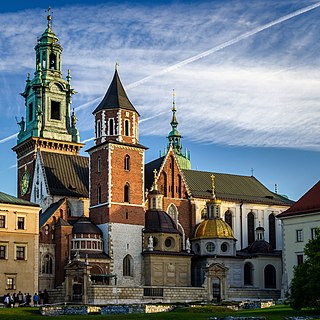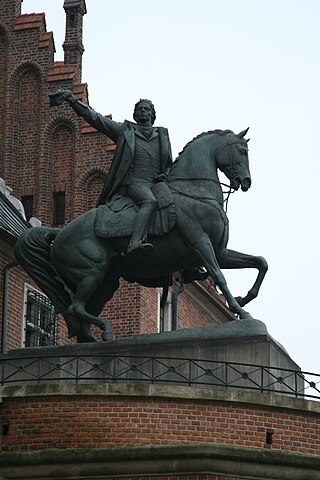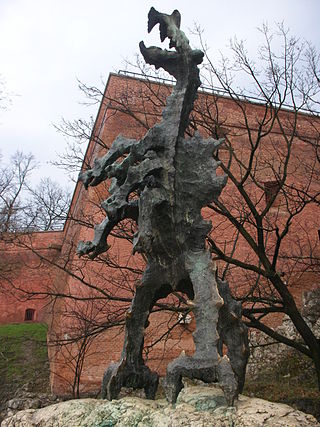Self-guided Sightseeing Tour #6 in Krakow, Poland
Legend
Guided Free Walking Tours
Book free guided walking tours in Krakow.
Guided Sightseeing Tours
Book guided sightseeing tours and activities in Krakow.
Tour Facts
7.1 km
173 m
Experience Krakow in Poland in a whole new way with our free self-guided sightseeing tour. This site not only offers you practical information and insider tips, but also a rich variety of activities and sights you shouldn't miss. Whether you love art and culture, want to explore historical sites or simply want to experience the vibrant atmosphere of a lively city - you'll find everything you need for your personal adventure here.
Activities in KrakowIndividual Sights in KrakowSight 1: Synagoga Izaaka Jakubowicza
The Izaak Synagogue, formally known as the Isaak Jakubowicz Synagogue, is an Orthodox Jewish congregation and synagogue, located at 18 Kupa Street, in the historic Kazimierz district of Kraków, in the Lesser Poland Voivodeship of Poland. Designed by Francesco Olivierri in the Baroque style and completed in 1644, the synagogue is named for its donor, Izaak Jakubowicz, also called Isaac the Rich, a banker to King Ladislaus IV of Poland.
Sight 2: Synagoga Kupa
The Kupa Synagogue, also known as the Synagogue of the Poor, is a former Jewish congregation and synagogue, that is located at 8 Warszauera Street, in the historic Kazimierz district of Kraków, in the Lesser Poland Voivodeship of Poland. The 17th-century former synagogue is located in a neighborhood earmarked in 1495 by King John I Albert for the Jewish community, that was transferred from the budding Old Town.
Sight 3: Synagoga Tempel w Krakowie
The Tempel Synagogue is a Reform Jewish congregation and synagogue, located at 24 Miodowa Street, in the historic Kazimierz district of Kraków, in the Lesser Poland Voivodeship of Poland. Designed by Ignacy Hercok in the Moorish Revival and Rundbogenstil styles and completed in 1862, the synagogue is a major place of worship, and also a booming center of Jewish culture, which hosts numerous concerts and meetings, especially during the Kraków Jewish Culture Festival.
Sight 4: Kościół pw. Świętej Agnieszki
St. Agnes Church – a historic, Baroque, Roman Catholic church located in Krakow, in the First Old Town district at 30 Józefa Dietla Street, in Stradom. It serves as a garrison church.
Sight 5: Kościół pw. Nawrócenia Świętego Pawła
The Church of the Conversion of St. Paul – a historic Roman Catholic conventual church of the missionaries located in Krakow, in the Old Town district I at 6 Stradomska Street, in Stradom.
Sight 6: Muzeum Przyrodnicze PAN
The Museum of Natural History in Krakow is a museum located in Krakow at 9 St. Sebastian Street. There is a prepared, perfectly preserved, prehistoric woolly rhinoceros, the only completely preserved specimen of this animal in the world, extinct over 12 thousand years ago. Since October 2012, it has resumed its activity.
Wikipedia: Muzeum Przyrodnicze Instytutu Systematyki i Ewolucji Zwierząt PAN (PL), Website
Sight 7: Kościół pw. Świętego Józefa
St. Joseph's Church – a historic Roman Catholic conventual church of the Bernardine Sisters, located in Krakow, in the Old Town district I at 21 Poselska Street, in the Old Town.
Wikipedia: Kościół św. Józefa w Krakowie (ul. Poselska) (PL)
Sight 8: Planty Park in Krakow
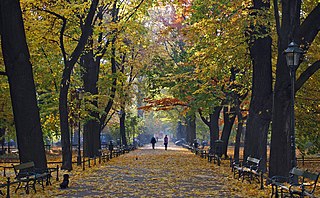
Planty is one of the largest city parks in Kraków, Poland. It encircles the Stare Miasto , where the Medieval city walls used to stand until the early 19th century. The historic Old Town is not to be confused with the Administrative District No. 1 Stare Miasto extending further east.
Sight 9: Geological Museum
Muzeum Geologiczne Instytutu Nauk Geologicznych PAN w Krakowie is a museum in Kraków, Poland. The collection dates back to 1865.
Sight 10: Church of Saints Peter and Paul
The Church of Saints Peter and Paul is a Roman Catholic Polish Baroque church located at 54 Grodzka Street in the Old Town district of Kraków, Poland. It was built between 1597–1619 by Giovanni Maria Bernardoni who perfected the original design of Józef Britius. It is the biggest of the historic Churches of Kraków in terms of seating capacity. Since 1842 it serves the Catholic All Saints parish.
Sight 11: Church of Saint Andrew
The Church of St. Andrew in the Old Town district of Kraków, Poland located at Grodzka Street, is a historical Romanesque church built between 1079 and 1098 by a medieval Polish statesman Palatine Sieciech. It is a rare surviving example of the European fortress church used for defensive purposes.
Sight 12: Piotr Skarga
The Monument of Piotr Skarga in Kraków is a monument to the Jesuit theologian and preacher Piotr Skarga, located on Maria Magdalena Square in Kraków, opposite the Church of St. Peter and Paul, where Skarga is buried. Its author is Czesław Dźwigaj, and the founder is the Archconfraternity of Mercy.
Sight 13: Kościół Świętego Marcina
St. Martin's Church – a historic Evangelical church located in Krakow, in the Old Town district I at 56 Grodzka Street, in the Old Town.
Sight 14: Kościół pw. Świętego Idziego
Church of St. Giles in Kraków is a Roman Catholic church of the Dominican Order located on Grodzka Street in Kraków. Its history dates to 11th century; it has been rebuilt many times since.
Sight 15: Kościół pw. Świętego Bernardyna ze Sieny
Church of St. Bernardine of Siena – a historic Roman Catholic rectory and conventual church of the Bernardines, located in Kraków, in the Old Town district I at 2 Bernardyńska Street, in Stradom.
Sight 16: Baszta Senatorska
The Senator's Tower – the highest of the three fully preserved towers at Wawel. Together with the Sandomierz Tower, it forms a unique complex of the so-called fire towers.
Sight 17: Sandomierska Tower
Sandomierz Tower-one of the three existing towers on the Wawel Hill, located on its southwestern edge. Together with the Lubranka (senatorial) tower, it creates a unique team of the so -called Fire tower from the mid -15th century.
Sight 18: Baszta Kobieca

The Women's Tower, also known as the Maiden Tower – the tower of Wawel Hill, from the fourteenth century. It was demolished by the Austrians in 1851 in connection with the construction of defensive walls around Wawel Hill. The hill became one of the elements of the Kraków Fortress.
Sight 19: Baszta Szlachecka
The Noble Tower – a tower on Wawel Hill, from the fourteenth century. The upper part was reconstructed in 1958. The name comes from the former function of a building-prison for the nobility. Next to it there is the Tęczyńska Tower and the Women's Tower.
Sight 20: Zamek Wawel
The Wawel Royal Castle and the Wawel Hill on which it sits constitute the most historically and culturally significant site in Poland. A fortified residency on the Vistula River in Kraków, it was established on the orders of King Casimir III the Great and enlarged over the centuries into a number of structures around an Italian-styled courtyard. It represents nearly all European architectural styles of the Medieval, Renaissance and Baroque periods.
Sight 21: Royal Archcathedral Basilica of Saints Stanislaus and Wenceslaus
The Wawel Cathedral, formally titled the Archcathedral Basilica of Saint Stanislaus and Saint Wenceslaus, is a Catholic cathedral situated on Wawel Hill in Kraków, Poland. Nearly 1000 years old, it is part of the Wawel Castle Complex and is a national sanctuary which served as the coronation site of Polish monarchs.
Sight 22: Wawel
Get Ticket*The Wawel Royal Castle and the Wawel Hill on which it sits constitute the most historically and culturally significant site in Poland. A fortified residency on the Vistula River in Kraków, it was established on the orders of King Casimir III the Great and enlarged over the centuries into a number of structures around an Italian-styled courtyard. It represents nearly all European architectural styles of the Medieval, Renaissance and Baroque periods.
Sight 23: Skarbiec Koronny
The Crown Treasury – an exhibition in the Wawel Royal Castle, containing a collection of memorabilia left by the reigning dynasties of Polish kings.
Sight 24: Wieża Jordanka
Jordanek Tower – one of the four residential towers of the Wawel Royal Castle, "blended" obliquely into the eastern wing of the residence. It was built in the fourteenth century. Originally, it was defensive in nature. The upper part was extended in the years 1520-1533 in the Renaissance style. In 1860, a new Baroque style helmet was installed on the tower, which referred to the shape of the cupola of the tower of Sigismund III Vasa and the cupola of the tower of Jan III Sobieski.
Sight 25: Wawel Zaginiony

Wawel Lost – an archaeological and architectural reserve and a permanent exhibition, located in a post-German building from the 40s of the twentieth century, erected on the site of the former royal kitchens at Wawel. It shows the architecture and history of the medieval Wawel Hill. In addition to the remains of old buildings, you can find here numerous artefacts found during excavations.
Sight 26: John Paul II Cathedral Museum

The John Paul II Cathedral Museum is a museum in Kraków, Poland. It is situated on Wawel Hill, between the Vasa Gate and the former seat of the Castle Seminary, in the Cathedral House, which is composed of two 14th-century buildings.
Sight 27: Brama Wazów
The Vasa Gate – the oldest of the three entrance gates leading to Wawel Hill. It is located between the chapter house buildings and the Cathedral House. It is a fragment of the Wawel fortifications. In the past, in front of the building, there were: a bastion, another gate and two defensive towers, which were demolished in December 1824.
Sight 28: Tadeusz Kościuszko Monument
Tadeusz Kościuszko Monument in Kraków, is one of the best known bronze monuments in Poland. It is the work of artists: Leonard Marconi, professor of Lviv University born in Warsaw, and his son in law, sculptor Antoni Popiel. The equestrian bronze statue of Kościuszko—Polish and American hero of independence—is located along the west side entrance to the Wawel Castle in the Old Town.
Sight 29: Wawel Dragon
Get Ticket*Wawel Dragon Statue is a monument at the foot of the Wawel Hill in Kraków, Poland, in front of the Wawel Dragon's den, dedicated to the mythical Wawel Dragon. Installed in 1972, the statue is capable of letting out fire from its mouth on demand.
Sight 30: Muzeum Sztuki i Techniki Japońskiej Manggha
Manggha is a museum in Kraków, Poland. Until 2005, it was a branch of the National Museum of Kraków.
Sight 31: Kaplica pw. Świętego Piotra i Świętego Pawła
The Chapel of Saints Peter and Paul the Apostles is a historic chapel located in Kraków, in district VIII at 13 Madalińskiego Street, in Dębniki.
Share
How likely are you to recommend us?
Disclaimer Please be aware of your surroundings and do not enter private property. We are not liable for any damages that occur during the tours.
GPX-Download For navigation apps and GPS devices you can download the tour as a GPX file.
